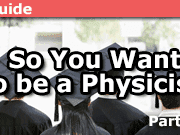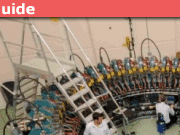How to Get a Physics Job!
Full Chapter List - So You Want To Be A Physicist... Series
Part I: Early Physics Education in High schools
Part II: Surviving the First Year of College
Part III: Mathematical Preparations
Part IV: The Life of a Physics Major
Part V: Applying for Graduate School
Part VI: What to Expect from Graduate School Before You Get There
Part VII: The US Graduate School System
Part VIII: Alternative Careers for a Physics Grad
Part VIIIa: Entering Physics Graduate School From Another Major
Part IX: First years of Graduate School from Being a TA to the Graduate Exams
Part X: Choosing a Research area and an advisor
Part XI: Initiating Research Work
Part XII: Research work and The Lab Book
Part XIII: Publishing in a Physics Journal
Part XIV: Oral Presentations
Part XIII: Publishing in a Physics Journal (Addendum)
Part XIV: Oral Presentations – Addendum
Part XV – Writing Your Doctoral Thesis/Desertation
Part XVI – Your Thesis Defense
Part XVII – Getting a Job!
Part XVIII – Postdoctoral Position
Part XIX – Your Curriculum Vitae
In the previous chapter, we have reached the point where you have finished with your thesis defense, and also thesis submission to the graduate school. You are all set to go into the nasty physics world and look for a job.
If that is your case, then you are SCREWED! You do NOT start to look for a job only after you are done with your defense. This will be too late and should only be resorted to if you have no other choice. So while you think you are done with your physics curriculum, your job future requires that we go back in time to about one year before you plan on graduating.
By that time, you would have an idea of your career path. You should know if you wish to pursue an academic career, an industrial career (for those of you who have this option), or maybe even get out of physics completely. Still, unless you have a Nobel Laureate as an adviser and have made a name for yourself in such a way that there are institutions rolling out the red carpet for you, you should keep your options open. Remember, you will have to start making a living, and ideals will not feed you much.
I will go into the academic career path first since this is the more tedious side. If you do decide to follow this path, then you will have to start seeking a post-doctoral appointment. Most universities and national laboratories will tend to hire new Ph.D.s at the post-doctoral level (note that US National laboratories will not hire a Ph.D. for a post-doc position who obtained a Ph.D. beyond 4 years of the date of the appointment).
There are two common places to look for openings for a post-doc position. The first is the classified section of Physics Today. Typically, the largest number of openings for post-doc and faculty positions are advertised during the Fall/early Spring for an appointment in the Fall of the following year. So an opening for Fall 2007 would tend to get advertised more often in Fall 2006/ early Spring 2007. This is why you have to start almost a year in advance in your job hunt.
The other avenue to find post-doc openings is during physics conferences, especially the APS March and April Meetings. The APS provides a job service to both job seekers and employers during the conference. You will have to register with the APS and submit your resume. While you don’t have to attend these conferences to submit your resume, I strongly advise you to be present. There are professors and schools that will advertise for an opening right on the spot (these are usually posted on the Job Center bulletin boards). So you can also look for something that you might qualify for and immediately make contact. Not only that, but in many cases, if you have submitted a resume, you might be contacted by an employer present at the conference, and an interview can be set up during the conference itself.
This is where I will illustrate with my own personal experience. A few months before I graduated, I attended the APS March Meeting to not only present a talk but also continue looking for a job. I already had an offer from Applied Materials to go into the industrial route. While I was excited about this and would pursue this line gladly, I knew that my first aim was still in academia/research and so I continued to look. Attending the Job Fair at this March Meeting was almost a last-minute decision. As fate would have it, a faculty member was looking for a post-doc to work at Brookhaven and happened to be well-acquainted with my adviser at that time. He read my resume and figured that with my background and with the “name recognition” from my adviser, that I would be a strong candidate. I received a message from the Job Center of a request for an interview later in the week of the conference. However, without my knowing it, the faculty member seeks out when I will be presenting my talk, and attended the session to see me “in action”, so to speak.
I found this out later during our interview, and he was satisfied that I fit the bill to carry out the research work that he had planned. While no job offers were made at the interview, I left feeling that it went tremendously well. It was a week later that the job offer was officially made, which I accepted.
The moral of the story here is that in many cases, you truly have to try all the possible avenues, and the Job Fair at these conferences can be quite effective because, in many instances, the employers are also there seeking candidates.
The last possible avenue is the one that is very uncertain and something you should not depend on – word of mouth. Often, various faculty members, usually your adviser, would have heard from his/her various colleagues or contacts, about post-doc openings elsewhere, or even within your department. If a faculty member recommends something to you, consider it seriously. There’s a good chance that the person looking to hire knows the faculty member, and name recognition alone will give you a leg up on another candidate. This is what I meant by “pedigree” in an earlier chapter of this series. Unfortunately, this situation doesn’t happen often, and that is why I said that you should not rely on such a thing happening.
If instead, you are opting for an industrial or non-academic position, then you need to cast your net a lot wider. Sources such as Physics Today and the APS Meetings are still valid since those do carry non-academic positions (that was how I managed to snag the Applied Materials offer). However, you also need to look at the “trade journal” of the area you are looking for. Solid-state physics specialists should look in IEEE journals, for example.
Do not forget to use your school’s job placement services. Many employers will seek out new graduates, and your school can also list your resume with employers they think might be interested in your background. Industrial employers will tend to go through this route, especially if they had success with a particular school before. So don’t leave out this option.
Again, all of these should be done approximately a year before you plan on graduating. Make sure you have your resume ready. Have it checked properly, and make sure you include ALL publications.
In the next installment, I will go into your role as a post-doc fellow, and how things will look different from that point onwards.
PhD Physics
Accelerator physics, photocathodes, field-enhancement. tunneling spectroscopy, superconductivity








Necropost!!Insights are never necro, always relevant :)
Classic advice, must read!Necropost!!
<ZapperZ runs and hides>
Zz.
Classic advice, must read!
Nice series of topics, wish I knew about them when I was younger.